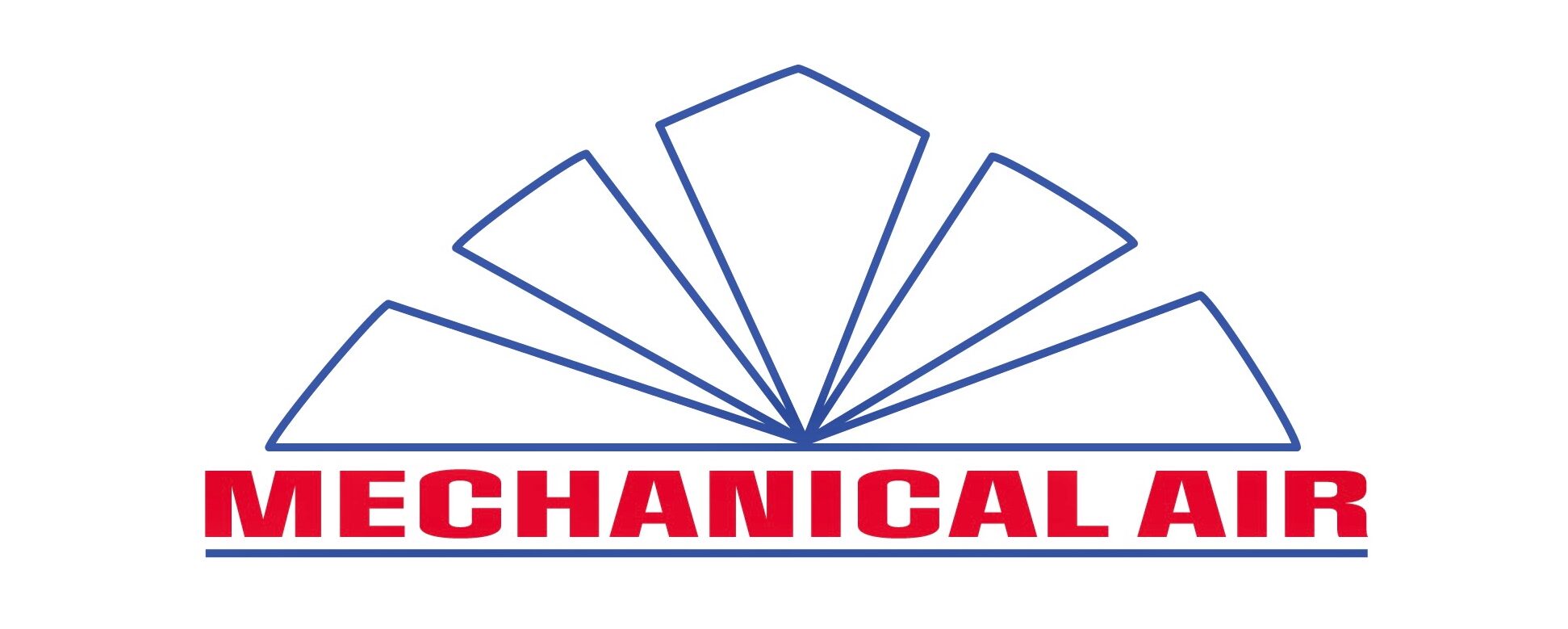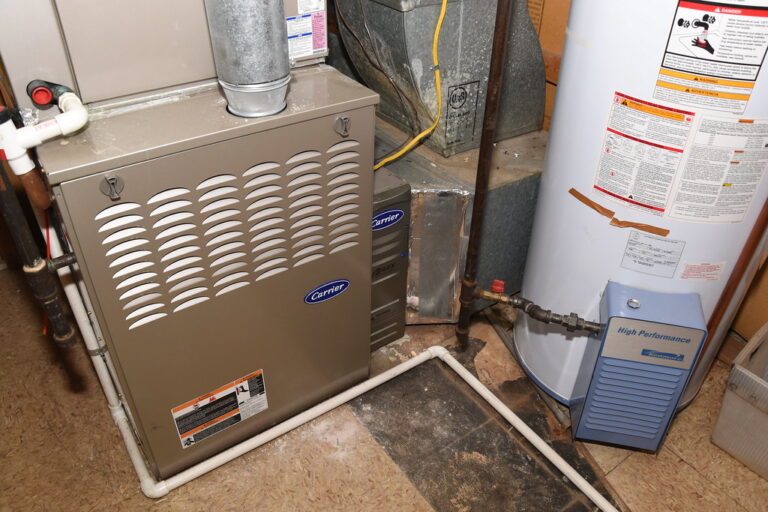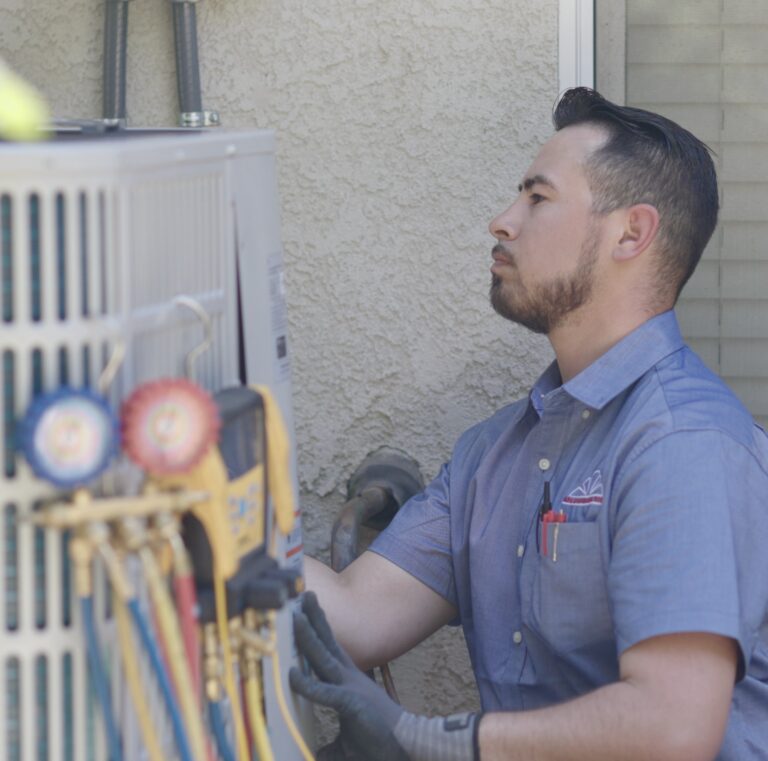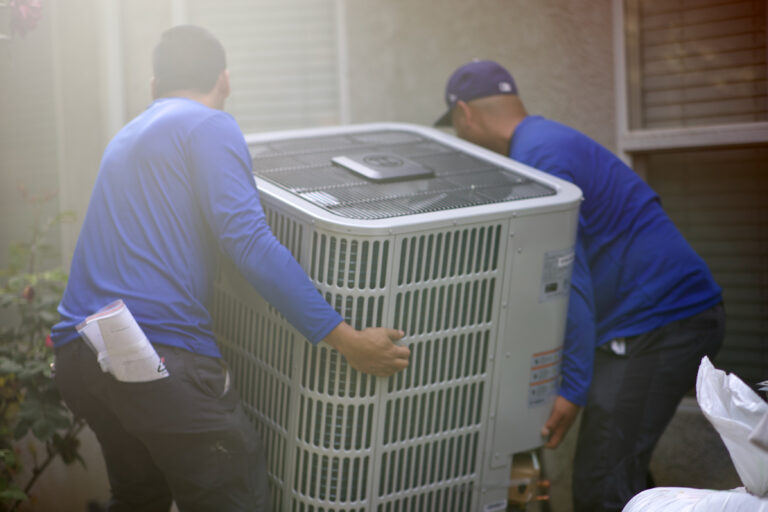Air conditioner problems can make the scorching summer heat unbearable without the cool relief of your AC. Just like any other appliance, air conditioners face issues, and if not repaired in time, they can turn into bigger problems. To help you, we’ve compiled a list of 11 common central air conditioner problems you might face this year and how to fix them. So, let’s dive in!
Refrigerant Leak
A common problem that homeowners face with their air conditioners is a refrigerant leak, which occurs when there’s a tear or hole in the coils or refrigerant lines. This issue leads to the AC not cooling effectively and can cause further damage if left unattended. When refrigerant leaks, your system has to work harder, resulting in decreased efficiency and increased energy bills. It’s crucial to address a refrigerant leak immediately to prevent additional harm to the compressor and to ensure that your AC continues to operate effectively. Regular inspections by an HVAC professional can help detect and repair these leaks before they cause serious damage.
Thermostat Malfunction
A faulty thermostat may be the reason why your home isn’t cooling properly. If the thermostat isn’t working correctly, it won’t communicate with your AC system effectively, which can lead to uneven temperatures and discomfort. It’s vital to ensure your thermostat is correctly programmed and positioned in an appropriate location away from heat sources, like direct sunlight or lamps. If you suspect an issue, it’s best to call an HVAC professional to diagnose and fix the problem. Upgrading to a smart thermostat can also help optimize temperature control, improving comfort and efficiency.
Clogged Drain Line
The drain line in your air conditioner has the essential function of removing excess moisture from the unit. However, if the drain line becomes clogged with dirt, algae, or debris, it can lead to water damage, mold growth, and decreased system performance. A clogged drain line can cause water to back up into the unit, leading to leaks and potential damage to other components. To avoid further damage, it’s vital to unclog the drain line regularly and ensure it remains clear. Routine maintenance by an HVAC technician can help prevent clogs and keep your system functioning properly.
Dirty Air Filters
Dirty air filters are one of the most common air conditioner problems, yet they are also one of the easiest to prevent. When air filters become clogged with dust, dirt, and debris, they restrict airflow, reducing the cooling efficiency of your system and causing it to work harder. This increased strain can lead to higher energy consumption, increased wear on the system, and uneven cooling throughout your home. It is essential to replace your air filters at least every three months or more frequently if you have pets or suffer from allergies. Clean filters allow your AC to run smoothly, improve indoor air quality, and help keep your energy costs in check.
Blown Fuses
Fuses play a critical role in regulating the amount of electrical current flowing through your air conditioner. When a sudden power surge occurs, the fuse can blow, causing the AC to shut down. Blown fuses are a safety mechanism that protects your AC unit from damage due to excessive electrical current. If your AC stops working unexpectedly, a blown fuse could be the culprit. A professional HVAC technician can safely replace the blown fuse and reset your central air conditioner, ensuring it is up and running again without risking further damage or safety hazards.
Squeaky Blower Motors
A squeaky blower motor often indicates that the motor is wearing out or needs lubrication. When a blower motor is not functioning properly, it can impact the cooling efficiency of your AC, leading to uneven temperatures and increased energy use. Ignoring a squeaky motor can also lead to more serious problems, such as compressor failure, which can be costly to repair. Regular maintenance, including lubricating the blower motor, can prevent these issues and extend the lifespan of your AC system. If you hear unusual noises from your blower motor, it’s best to schedule a professional tune-up to address the problem.
Faulty Capacitor
Capacitors are vital components in air conditioners, providing the power necessary for the motors to operate. When a capacitor fails, your AC may struggle to start, fail to run properly, or shut off unexpectedly. A faulty capacitor can also cause the system to overheat, leading to damage to other components. It’s important to have a qualified technician diagnose and replace a faulty capacitor promptly to avoid further issues. Regular maintenance can also help identify capacitor problems early, ensuring your AC continues to operate efficiently without interruption.
Damaged Compressor
The compressor is one of the most critical components of your AC unit, as it is responsible for circulating refrigerant throughout the system. A damaged compressor can result in your AC failing to cool your home effectively, and it is often an issue that homeowners dread due to the high cost of repairs. Signs of a damaged compressor include unusual noises, frequent tripping of the circuit breaker, and reduced cooling performance. Repairing or replacing the compressor promptly is essential to prevent further damage to the system and maintain comfort in your home. Regular maintenance and addressing issues early can help extend the life of your compressor.
Dirty Coils
Dirty coils are another common issue that can affect the efficiency of your air conditioning unit. The evaporator and condenser coils play a crucial role in the cooling process, and when they become covered in dirt and grime, their ability to transfer heat is significantly reduced. This leads to increased energy consumption, reduced cooling performance, and a greater likelihood of system failure. Scheduling an annual tune-up with an HVAC professional is the best way to ensure your AC coils are clean and functioning efficiently. Clean coils help maintain optimal cooling, lower energy bills, and extend the life of your system.
Faulty Electrical Connections
Faulty electrical connections in your air conditioning system can be hazardous and lead to complete system failure. Loose or damaged wires can cause short circuits, affecting the performance of your AC and posing a fire risk. It’s important to have an HVAC professional perform regular maintenance on your system to inspect and repair any faulty electrical connections. Proper maintenance helps ensure the safety of your AC unit and prevents unexpected breakdowns, keeping your home comfortable and secure.
Frozen Condenser Coils
Frozen condenser coils can be a sign of several underlying issues, such as low refrigerant levels, dirty air filters, or a defective blower motor. When the condenser coils freeze over, your AC loses its ability to cool effectively, and it can cause additional strain on the system. If you notice ice forming on your AC coils or if your system isn’t cooling properly, contact a qualified HVAC technician to diagnose and repair the problem. Addressing frozen coils promptly can prevent further damage and keep your air conditioner running efficiently.
We hope that the above information prepares you for the most common central air conditioner problems you might face this year. As always, it’s crucial to have a licensed HVAC technician inspect your unit every year to avoid these problems. Mechanical Air is happy to help with any air conditioner issues you may encounter in 2023. Give us a call today, and we’ll be right over!






